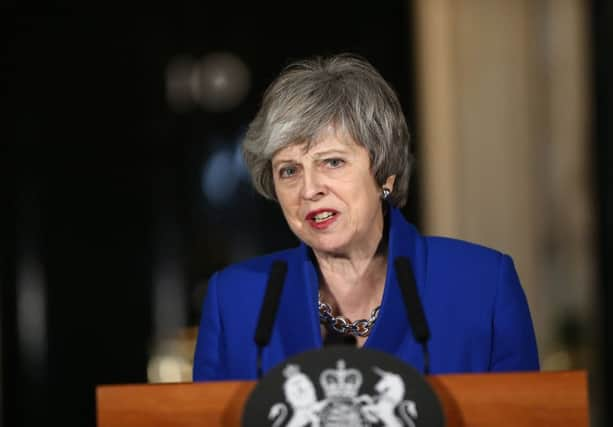David Behrens: Second referendum appears the only way out of the Brexit farce


It had been Theresa May’s fear that in rejecting her deal with Brussels, MPs would lose the trust of the public. She was right – though it was already hanging by a thread.
Advertisement
Hide AdAdvertisement
Hide AdThe pantomime plot played out this week by caricature politicians invested only in themselves served to illustrate the gulf that has opened up between Westminster and the rest of us.
Brian Rix himself could not have come up with a Whitehall farce so ridiculous. His script editor would have sent him away to do a rewrite.
That is more or less what Mrs May was told to do on Tuesday night, and not for the first time. But it is a fool’s errand. The EU was never a willing negotiator, and its stance throughout the process will have reinforced the views of many, Brexiteers and Remainers alike, that it is arrogant and imperious.
Its stubbornness has been matched by that of the PM, as she vainly tried to push through a deal for which the majority voted but almost no one wanted. Meanwhile, Jeremy Corbyn, whose ambiguity on the whole question of Brexit may well come to define his leadership, could offer nothing constructive; just the procedural diversion of a no-confidence motion he knew would fail.
Advertisement
Hide AdAdvertisement
Hide AdNone of this did anything to heal the social divisions that the referendum exposed.
If we have learned one thing from the multiple impasses of the past few days, it is for the need to find a way out of the endless loop of “meaningful votes”, amendments and motions that has gridlocked Westminster. It’s like a low-budget remake of Groundhog Day, with Bill Murray unavailable and Jacob Rees-Mogg cast in his place.
The obvious escape lane, as the country rolls without brakes down the hill towards Land’s End, is the slip road to a second referendum – the hard shoulder to cry on. Mrs May has said that to take it would be to admit that parliament had failed to deliver the mandate of Brexit. But that is manifestly now the case.
The groundswell of opinion, inside and outside Westminster, for a second poll will doubtless gather momentum in the coming weeks, but in the meantime, the possibility remains that MPs of all parties may finally act counter to their instincts and seek ground that unites, rather than divides, them. It’s what we elected them to do.
Advertisement
Hide AdAdvertisement
Hide AdGiven the disparity of views on both sides of the House, we must live in hope, not expectation, that this will happen. Mrs May has promised to consult across the political spectrum to find her mythical Plan B, but her conditions make a deal with Labour – which is no less divided than her own party – unlikely.
A more realistic short-term scenario is for the Government to seek an extension of Article 50 until the summer. That will be a fraught negotiation in itself.
Many, not least Mr Corbyn, have seen the scale of Tuesday’s historic defeat as the complete failure of Government policy on Brexit, but that is an oversimplification. There never was a policy to cover the eventuality of a Leave vote in 2016 because no one in Whitehall expected it to happen. The result was supposed to have been the same foregone conclusion as that of the forgotten “alternative vote” referendum foisted on us in 2011 by Nick Clegg.
The deadlock of the last few months comes back to stubbornness, and to Mrs May’s spectacular knack of taking advice from entirely the wrong people. She gave away her majority by failing to recognise the popular support enjoyed by Mr Corbyn, and disastrously undermined the foundations of her own party by taking victory in 2017 as a given. Badly briefed once more, she proved a hapless negotiator, and Brussels could see her coming.
Advertisement
Hide AdAdvertisement
Hide AdYet in laying down non-negotiable conditions of ending freedom of movement, leaving the single market and the jurisdiction of the European Court of Justice – her so-called red lines – she is at least respecting the spirit of the 2016 mandate.
When her political history is written, which will be soon, the careful path she tried to steer will stand in stark contrast to that of those whose only strategy was to grab the wheel as Land’s End approached.